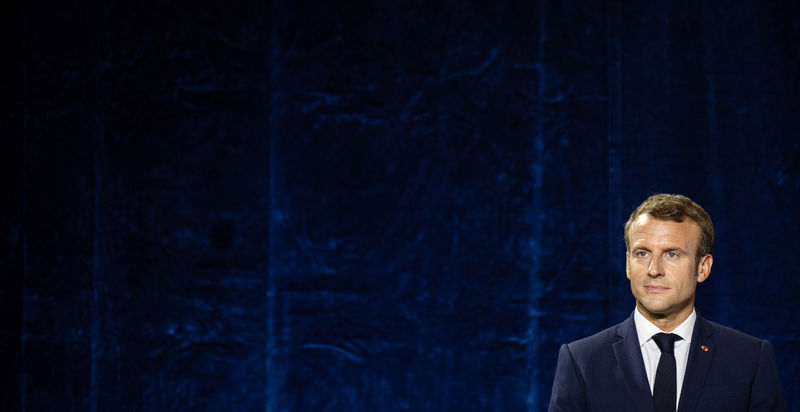By Jan Strupczewski
BRUSSELS (Reuters) - European Union finance ministers will clash next week over how to fund a small pool of money specifically for euro zone countries to finance investment and reforms to align their economies with each other and boost competitiveness.
The discussions among the finance ministers of the 27 countries that will remain in the EU after Britain leaves the bloc will bring to an end two years of talks that have reduced France's ambitious idea of a euro zone budget to a bare minimum.
The key issue still to be resolved is whether the ring-fenced budget should be financed only from the wider, long-term EU budget of both euro and non-euro countries, or if it should have external sources of revenue like dedicated taxes.
French President Emmanuel Macron proposed in 2017 that the euro zone should create its own budget of several percentage points of GDP to narrow differences in economic performance among the 19 countries using the euro and provide a means to stabilize countries hit by economic shocks.
He wanted such a budget, of substantially more than 200 billion euros, to be financed from dedicated taxes and provide the economic counterweight to the single monetary policy of the European Central Bank. His position was, to some extent, shared by Germany, Italy, Spain and Slovakia.
But fierce opposition from the Netherlands and other northern countries like Ireland, Finland, Austria, Belgium and the Baltics, worried about the extra spending and moral hazard, means the end-result will fall well short of Macron's vision.
VERY SMALL
The budget, or the Budgetary Instrument for Competitiveness and Convergence (BICC), is likely to be only around 17.5 billion euros - the euro zone's share of the 25 billion euro pool of funds proposed by the European Commission to support reforms in the next EU long-term budget.
The money would be divided between the 19 euro zone countries over seven years leaving around 130 million euros per euro zone country per year, if the money is distributed evenly.
"The whole thing is a charade ... to save President Macron's face. The time and effort put into the BICC negotiations are in no proportion whatsoever to its final economic importance," a senior euro zone official said.
The meagre funds would finance only investment and reforms, with their use not permitted to stabilize economies hit by economic shocks not of their own making, a result of concerns from the Netherlands and its allies about free-riding and moral hazard.
The only way the money could contribute to economic stabilization would be through adjusting the national contribution to investment projects co-financed by it.
In times of economic strength, a country would get less co-financing from the fund, while those in the doldrums could count on the euro zone budget picking up more of the tab than usual.
Details are to be decided next Wednesday.
To satisfy those who want the budget to grow through external revenues sources, a compromise is likely to include an "enabling clause" allowing such an option in the future through an intergovernmental agreement. But joining such an agreement would be on a voluntary basis only.
Some senior euro zone officials note that while small now, the very creation of such a financial instrument for the euro zone was "a foot in the door" and that once proven useful it would quickly expand to a more meaningful size.
But others poured cold water on such views.

"Sometime in the future maybe ... in 2028, euro zone countries might well double it – to some 6 billion annually. But not 10 times," the second senior official said.